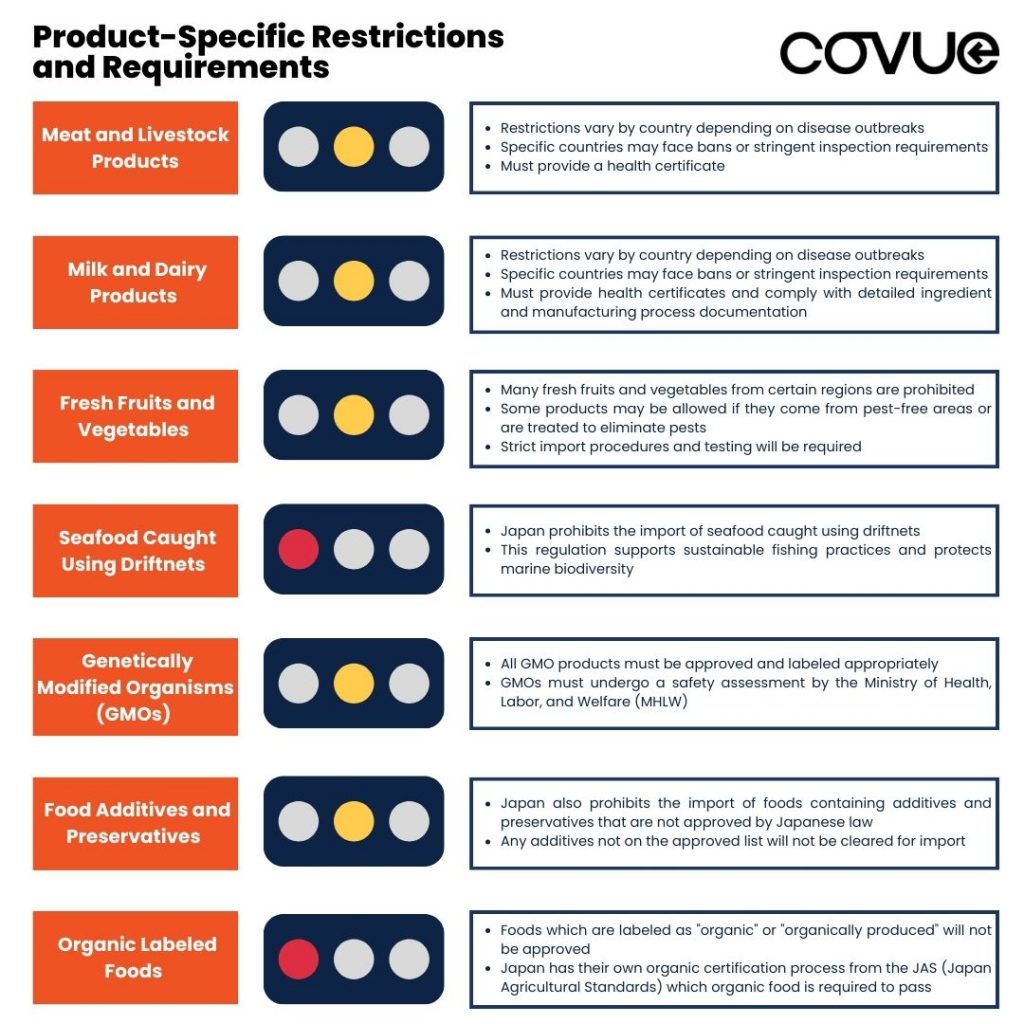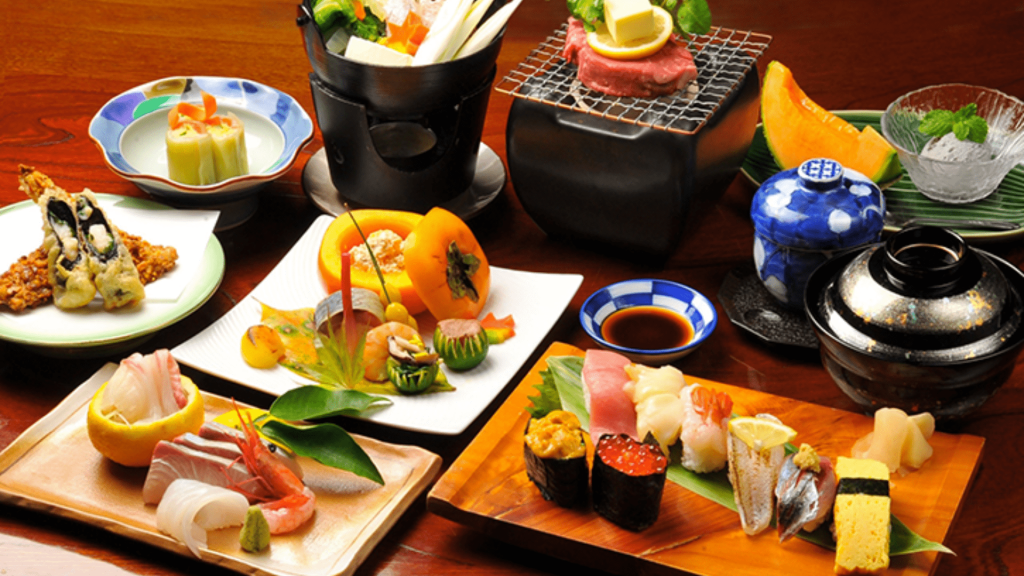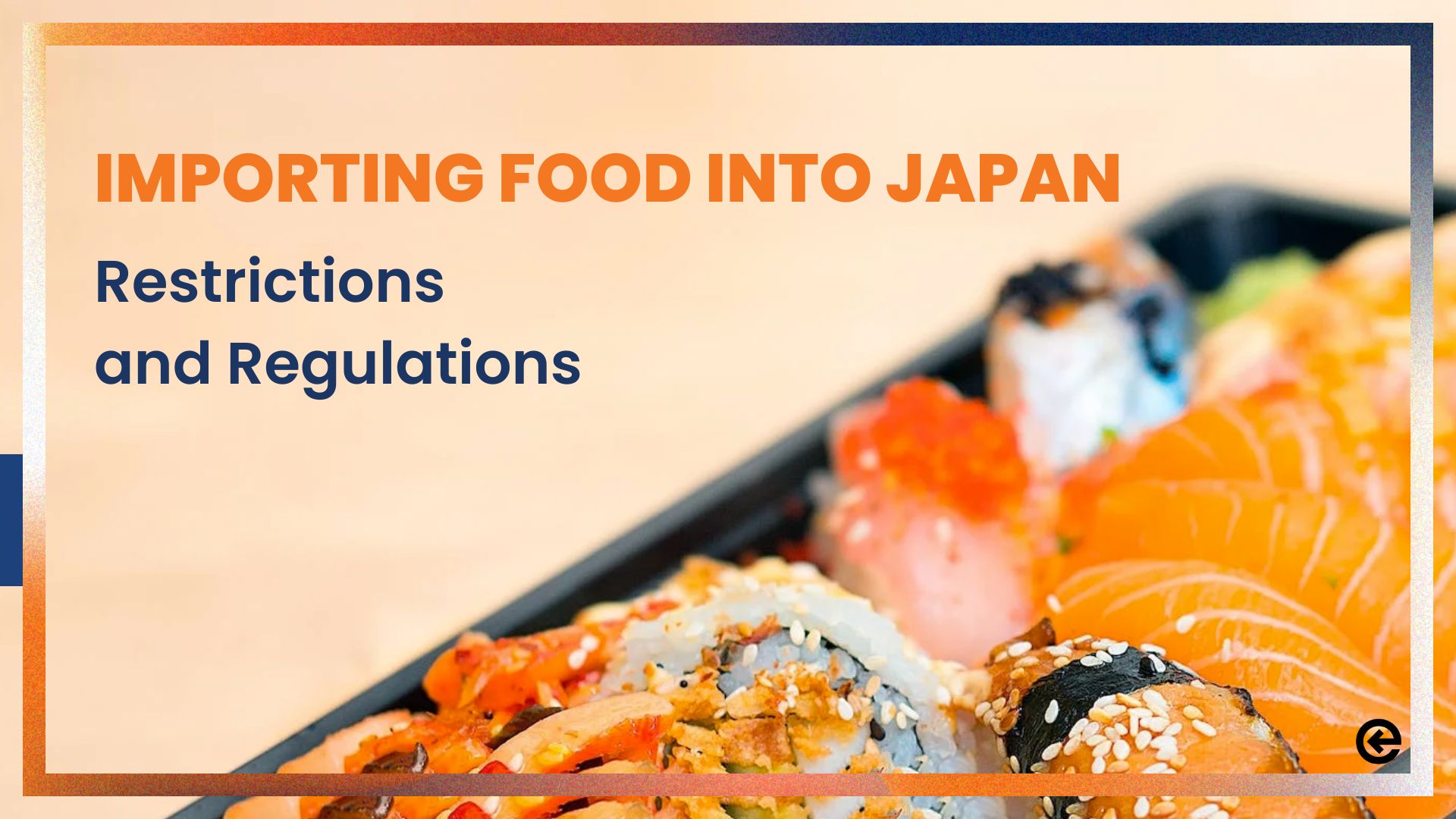Food Import to Japan: Restrictions and Regulations
Navigating the complexities of doing business in Japan and importing food can be daunting. Japan enforces some of the strictest food safety standards globally to ensure consumer protection and preserve its domestic agriculture industry. Here’s a comprehensive guide to understanding these regulations and how you can successfully navigate them.
Understanding Japan’s Food Safety Standards
Japan’s food safety standards, overseen by the Ministry of Health, Labor, and Welfare (MHLW) and enforced by the Ministry of Agriculture, Forestry, and Fisheries (MAFF), are among the most stringent in the world. These agencies conduct thorough inspections of imported food products at ports of entry to ensure compliance.
At COVUE, we specialize in assisting foreign companies with the entire food import process—from meeting safety standards to managing labeling and packaging requirements, ensuring you meet Japan food import regulations.
Japan is very strict when managing the import of food, and regularly update the regulations. Some recent items to be aware of are as follows:
- Enhanced Monitoring of Imported Foods
The MHLW has increased the frequency of monitoring inspections, focusing on residual agricultural chemicals, aflatoxins, and pathogenic microbes. This requires importers to provide more detailed documentation on the origins and contents of their products. More details here. - Revised Nutritional Labeling Standards
Japan updated its nutritional labeling standards based on the 2025 Dietary Reference Intakes for Japanese, which include revised values for calcium and vitamin D. All imported food products must comply with these updated labeling requirements. Find more information here. - Updated Positive List for Food Contact Materials
In March 2024, Japan revised its regulations regarding food contact materials, updating the positive list of substances allowed for use in food packaging. Importers must ensure compliance with these new standards. Check out the details here. - Import Restrictions on Products Containing Class I Specified Chemicals
Japan has issued updated guidelines banning the import of products containing certain Class I specified chemicals. Importers must ensure their products do not contain these restricted chemicals. More info available here.
Product-Specific Restrictions and Requirements for Food Import

Meat and Livestock Products
Japan restricts the import of meat and livestock products from countries affected by diseases such as Bovine Spongiform Encephalopathy (BSE) or Foot-and-Mouth Disease (FMD). Restrictions may vary by country depending on disease outbreaks. Specific countries may face bans or stringent inspection requirements.
As a result, importers must provide a health certificate issued by the exporting country’s authorities. Products are subject to inspection and quarantine upon arrival.
Milk and Dairy Products
Similar to meat, dairy products are subject to strict sanitary and phytosanitary regulations to prevent the spread of diseases. Restrictions may vary by country depending on disease outbreaks. Specific countries may face bans or stringent inspection requirements.
If you are looking to import products in this category, you must provide health certificates and comply with detailed ingredient and manufacturing process documentation. Dairy products often require laboratory testing to ensure they meet Japanese safety standards.
Fresh Fruits and Vegetables
The import of fresh fruits and vegetables is governed by the Plant Protection Law to prevent the introduction of pests and diseases. Many fresh fruits and vegetables from certain regions are prohibited unless they undergo rigorous inspection and certification.
Some products may be allowed if they come from pest-free areas or are treated to eliminate pests, however, strict import procedures and testing will be required.
Seafood Caught Using Driftnets
Japan prohibits the import of seafood caught using driftnets due to concerns about overfishing and by-catch of non-target species, such as dolphins and sea turtles. This regulation supports sustainable fishing practices and protects marine biodiversity.
Genetically Modified Organisms (GMOs)
Import laws around GMOs are incredibly strict within Japan. Although GMOs are not outright banned, all GMO products must be approved and labeled appropriately. GMOs must undergo a safety assessment by the Ministry of Health, Labor, and Welfare (MHLW) and be listed on the approved GMO list.
Approved GMOs must be clearly labeled to inform consumers in accordance to Japanese standards.
Food Additives and Preservatives
Japan also prohibits the import of foods containing additives and preservatives that are not approved by Japanese law. This includes artificial flavors, colors, and sweeteners that are commonly used in processed foods.
Japan has a list of approved food additives and preservatives that can be used. Any additives not on the approved list will not be cleared for import. For any products that you are looking to import that contain additives or preservatives, you must provide detailed information on the additives used, including their purpose and ratio. Products containing unapproved additives are subject to rejection.
Organic Labeled Foods
Foods which are labeled as “organic” or “organically produced” will not be approved. Japan has their own organic certification process from the JAS (Japan Agricultural Standards) which organic food is required to pass. Even if your products are labeled organic in your country of origin, you must be certified by JAS to be sold as organic in Japan.
Begin your Food Import Journey
Importing food into Japan involves navigating a complex landscape of regulations designed to protect public health and the domestic agriculture industry. At COVUE, we offer comprehensive support to help you meet these stringent requirements and ensure a smooth entry into the Japanese market.

Stay informed about any changes to regulations by consulting Japan’s Ministry of Agriculture, Forestry and Fisheries or the Japan External Trade Organization (JETRO) before attempting to import any food items. For assistance and more detailed guidance on import compliance, contact COVUE. We’re here to help you every step of the way!
This article was originally posted on January 19, 2023, and updated with recent information on April 23, 2025.


